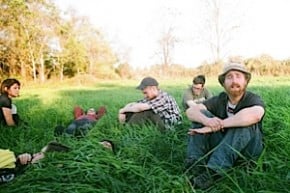One of the grant recipients of this year’s New York Ride and Retreat is Yiddish Farm, a program started this year with the goal of creating a pluralistic Yiddish-speaking community through farm-based programs. Yiddish Farm ran its pilot program this summer, with about 10 people who made up a Yiddish-speaking agricultural community on Kayam Farm, a sustainable farm in Maryland. In 2012, Yiddish Farm will move to a farm they have rented in Goshen, NY, which is not far from New York City, where they hope to eventually keep their community running year-round. Earlier this summer, The Jew and the Carrot interviewed Naftali Eidelman, who started Yiddish Farm along with Yisroel Bass. Here are some pieces of the interview that really give a sense of what Yiddish Farm is all about:
The Jew and the Carrot: So, what is the Yiddish Farm?
Naftali Ejdelman: Our purpose is to create opportunities to use Yiddish outside of the classroom. We’re using farming to strengthen the Yiddish speaking community. This year there will be three programs. The first is a three and half week Yiddish immersion organic farming program where participants will learn basic skills of organic farming, weaving, cooking. We’ll immerse ourselves in Yiddish culture, everything will be entirely in Yiddish.
The second is the Golus Festival — a four day outdoor camping adventure. All of the activities will either be related to Jewish culture around the world or natural skills like hide stretching, building chicken coups and soap making.
The final program is a Shabbat in Vineland, New Jersey, celebrating the accomplishment of Yiddish speaking farmer immigrants. It will be an important opportunity for [Yiddish farm veterans] to share their stories and for us to have a meaningful intergenerational Yiddish farming experience.
JCarrot: When did you get the idea for reviving the Yiddish farm?
NE: We started getting the idea for this a couple of years ago. I worked for Teva, did Hazon bike rides and was a fellow at Kayam Farm. For me that’s where it came from. I’m not sure I came up with the idea for the farm. Yisroel [Bass] also thought he did — he got it from reading about territorialist. Meira Goodman in Israel has also been pitching this idea for a while.
JCarrot: Who’s involved this summer and what sort of programs will you be running for the intensive farm participants?
NE: Yisroel is coordinating that program. He’s put together a really interesting program that includes Yiddish theater. We’re going to have someone from the Haredi world teaching Jewish agriculture laws in Yiddish. Eve Jochnowitz will be leading sessions on Jewish food and Chani Getter, a life coach, whose studying to be a rabbi will be leading sessions as well.
JCarrot: What will you do with the produce you grow on the farm in Goshen?
NE: There’s two aspects of this. We’ll grow items for sale and for us to eat. This will be more experimental. We’re not going to grow anything in large quantities unless we’ll be able to sell it. We’ve spoken to people in local community — we’re hoping to get customers from Hasidic communities — which may be too complicated because of the bugs involved in organic farming.
We’ll also sell in Orange County, New York to the Jewish community. We plan to set up a farmers market and CSA and eventually it’s possible that we would sell within the city.
Read the complete interview at The Jew and the Carrot.
Also be sure to check out “Kibbitzing and Kvetching Around the Clock,” a great video on Yiddish Farm and its two founders, Naftali and Yisroel:
Kibbitzing and Kvetching Around the Clock from Sam Guzik on Vimeo.
Learn more about the New York Ride and the 2011 Grant Recipients. Register for the Ride, sponsor a rider, or make a donation!





No comments yet.